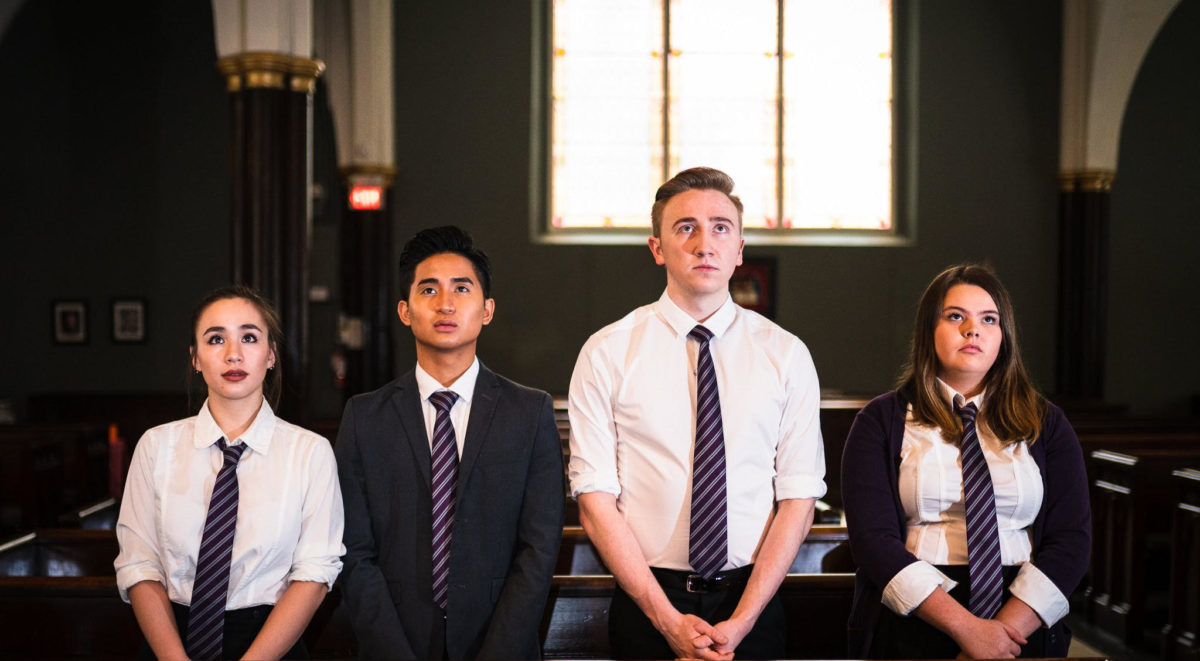
Photo by Sasha Aleshchenko
Review by Issie Patterson
It is not rare to go see a production put on by emerging young talent and immediately realize that some of these performers are destined for great success. This is the case for Bare, an exciting and at times devastating musical directed by Seamus Fera and produced by the youth-run Eternal Theatre Collective. Bare, originally written in the 90’s by Jon Hartmere and Damon Intrabartolo, follows an angst-inducing secretive romance between two gay students at an American Catholic school. The show centers around the agonizing push and pull between Peter (played by the brilliant Caleb Lagayan), who wants to make their romance public, and Jason (Robbie Hébert), who cannot imagine anything worse.
This production’s strengths lie in its young cast’s clear enthusiasm and energy, as well as the music itself. Bare is a rock musical, meaning the “orchestra” consists of only six young musicians. The story almost always progresses within songs, so there are very few scenes with dialogue rather than singing. This means that the musicians are very much the backbone of the production, controlling the rhythm and flow of the story. Caleb Chuang (Piano 1/Band Director) does an excellent job of leading the music, and his versatility on the piano (from ballads to jazzy rock vibes and beyond) is distractingly good.
One thing that detracted from the music was the fact that the performers’ mics were quite inconsistent. Oftentimes, mics would cut out entirely, leaving the audience clueless as to what was sung or spoken. In one particularly impressive moment, lead Caleb Lagayan continued singing a power ballad without his mic and could still be heard over the entire band. But missed dialogue and lyrics led to a murkier understanding of what was happening in the story. Although Caleb Lagayan’s and Robbie Hébert’s expressive acting made it very clear how they were feeling, many other key moments of the story were missed because of these technical difficulties.
Another aspect of the production that decentralized the story was the staging. Several moments and scenes—whether minuscule or monumental—take place in off-stage spaces. These spaces are located to the side of the audience, or, in one somewhat frustrating example, behind the audience. The concept itself is original and exciting; it works smoothly with the aesthetic of everywhereness and everyday life that director Seamus Fera has carefully constructed. Characters move through these spaces comfortably and casually, playing out side-stories and silent dramas that contribute to an uncanny sense of realism. However, the concept backfired in a few notable cases, such as when a performer delivered a power ballad from behind the audience.
Ashlyn Tegos and Katrina Teitz excel as the female leads, despite the narrow confines of their roles. Both performers have taken their characters—unimaginative 90’s era female stereotypes—and developed them into something much more profound and substantial. Ivy (Teitz), the typical promiscuous character, and Nadia (Tegos), Jason’s disenchanted sister who struggles with body image, have a toxic female friendship that is disappointing, considering theirs are the only interactions of any real substance between two women onstage during Bare. Having more story within dialogue rather than song might have provided an opportunity to deepen their dynamics and further develop their characters. Despite this setback, both Teitz and Tegos are powerhouse singers whose vocal performances are unforgettable.
Bare contains several unexpected delights, like a hilarious rap on the wonders of drugs by Lucas (Avidor Manor), an in-story production of Romeo and Juliet led by world-weary Sister Chantelle (Jessica Wong), and a heavenly visitation from the Spice Girls, which could in fact be the musical’s most enjoyable song. One of the simplest yet most delightful touches is that Bare is being performed in a church—as the performance starts, the church is filled with sunlight. As the story progresses, the church darkens and becomes filled with candlelight. This approach by lighting designer and stage manager Andie Lloyd subtly immerses the audience in the story.
Bare should be watched for its display of such impressive young talent in Vancouver’s theatre scene. The performers are putting everything they’ve got into this production, bringing an infectious energy to the experience that will remain with you long after you leave the church.
Bare is being performed at the Unitarian Church of Vancouver (949 W. 49th, Vancouver) until June 8th. For more information, visit their website.
Correction: An earlier version of this review stated that director Seamus Fera was responsible for the transition from sunlight to candle light in the musical. In reality, it was lighting designer and stage manager Andie Lloyd who was behind this approach to lighting.
Issie Patterson is a writer and composer from Toronto. Her plays have been performed in Halifax and Vancouver. Her compositions have appeared in numerous short films. Her short film, Bad Tooth, is going into indie production this fall. She is a recent graduate of the University of British Columbia’s MFA in Creative Writing.